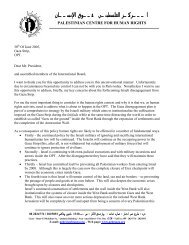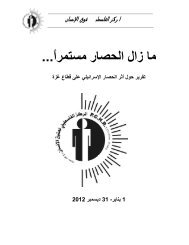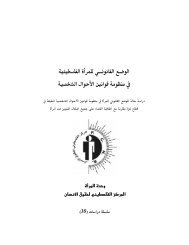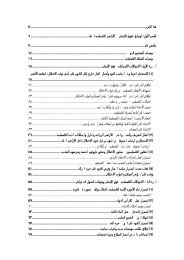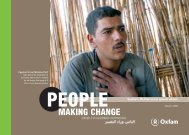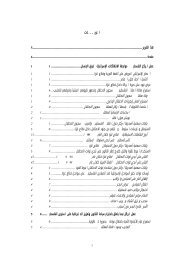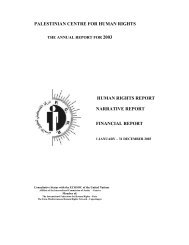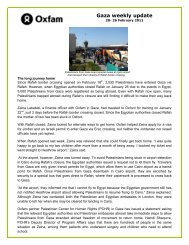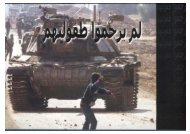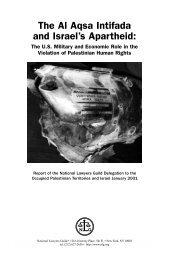Annual Report - Palestinian Center for Human Rights
Annual Report - Palestinian Center for Human Rights
Annual Report - Palestinian Center for Human Rights
You also want an ePaper? Increase the reach of your titles
YUMPU automatically turns print PDFs into web optimized ePapers that Google loves.
failure to act against such crimes has encouraged IOF to further disregard the lives of<br />
<strong>Palestinian</strong> children wherever they are throughout the West Bank and the Gaza Strip.<br />
The use of sonic booms by IOF against <strong>Palestinian</strong> civilians in September and<br />
October 2005 further evidences Israel's disregard <strong>for</strong> <strong>Palestinian</strong> children, particularly<br />
their mental health. In a letter sent to the Israeli Defense Minister on 28 October<br />
2005, the UN Special Coordinator <strong>for</strong> Middle East Peace Process, Alvaro De Soto,<br />
expressed his utmost concern <strong>for</strong> the impacts of the use of sonic booms on <strong>Palestinian</strong><br />
children. Based on a report by the World Health Organization, he pointed out that<br />
sonic booms, intensively used by Israel against <strong>Palestinian</strong> civilians in September and<br />
October 2005, caused psychological disorders in <strong>Palestinian</strong> children who were<br />
terrified by these booms. Sonic booms also damaged civilian property.<br />
Using <strong>Palestinian</strong> Civilians as <strong>Human</strong> Shields in Military Operations<br />
On 6 October 2005, the Israeli High Court ruled that it was illegal <strong>for</strong> IOF to use<br />
<strong>Palestinian</strong> civilians as human shields during military actions. The decision followed<br />
a petition filed by a number of human rights organizations 2002. The petition<br />
documented the IOF's use of <strong>Palestinian</strong> civilians as human shields since the<br />
beginning of the second Intifada, primarily during IOF operations carried out in<br />
<strong>Palestinian</strong> population centers. The true test of this ruling will be in its<br />
implementation.<br />
Using civilians as human shields in military operations is prohibited under<br />
international humanitarian law. 17<br />
IOF have continued to use <strong>Palestinian</strong> civilians as human shields during military<br />
operations in the OPT. Since the beginning of the current Intifada in September 2000,<br />
IOF have <strong>for</strong>ced <strong>Palestinian</strong> civilians, including children and women, to carry out<br />
tasks that posed threats to their lives, including:<br />
1) Walking in front of Israeli troops to shield them from gunfire, explosives or other<br />
attacks.<br />
2) Accompanying Israeli troops in their movement from one place to another.<br />
3) Entering houses and other <strong>Palestinian</strong> properties be<strong>for</strong>e Israeli troops during<br />
Israeli house raids that aim at searching <strong>for</strong> wanted <strong>Palestinian</strong>s.<br />
4) Approaching homes and requesting the residents leave their properties.<br />
5) Removing suspicious objects from roads.<br />
On 5 May 2002, the Legal <strong>Center</strong> <strong>for</strong> Arab Minority <strong>Rights</strong> in Israel (Addalah), on<br />
behalf of six other human rights organizations, submitted a petition to the Israeli High<br />
Court demanding that the court order IOF to stop using <strong>Palestinian</strong> civilians as human<br />
shields. Two days later, the Israeli Attorney General's Office submitted a response to<br />
this request. The State's response implicitly confirmed the IOF's use of these<br />
practices and claimed that IOF decided to prohibit the use of civilians as human<br />
shields. In light of this response, the court did not decide on the case and left the door<br />
open <strong>for</strong> the use of <strong>Palestinian</strong> civilians as human shields during military operations,<br />
17 Article 28 of the Fourth Geneva Convention prescribes that "the presence of a protected person may<br />
not be used to render certain points or areas immune from military operations." Article 51 of the<br />
Convention provides that "the Occupying Power may not compel protected persons to serve in its<br />
armed or auxiliary <strong>for</strong>ces…" Article 147 of the Convention further defines “willfully causing great<br />
suffering or serious injury to body …" as a grave breach of the Convention.<br />
26




